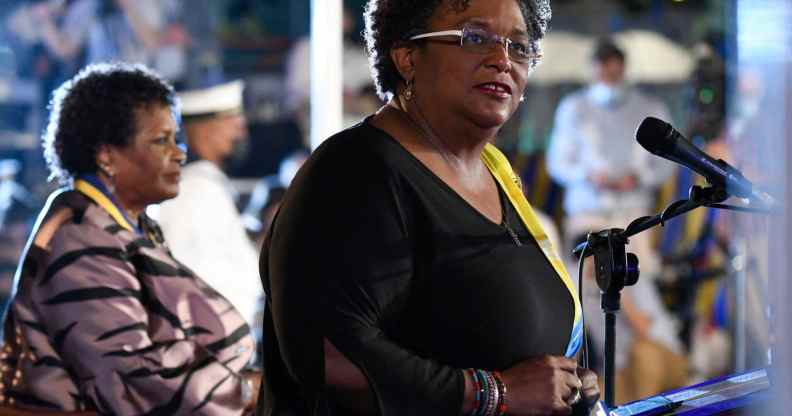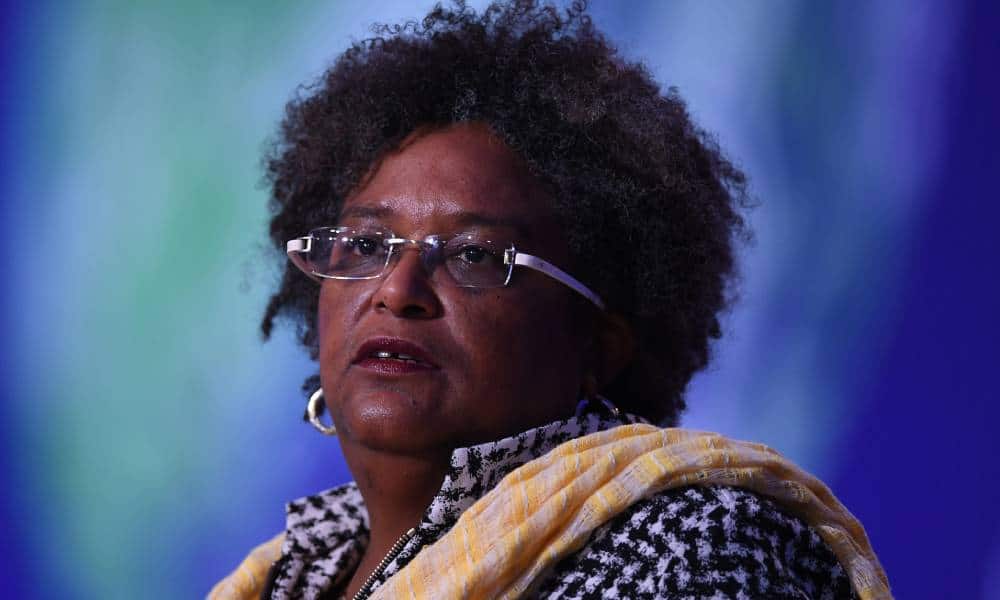Barbados can ‘wipe the slate’ on LGBT+ rights as a newly-christened republic, campaigners say

Barbadian prime minster Mia Mottley (R) and president Dame Sandra Mason. (Getty)
Barbadian prime minster Mia Mottley (R) and president Dame Sandra Mason. (Getty)
Activists say Barbados will be able to “wipe the slate” clean and determine its stance on LGBT+ rights as the world’s newest republic.
In November, Barbados removed Queen Elizabeth II as its head of state and welcomed in president Sandra Mason in a historic ceremony which broke the nation’s ties with the British monarchy. Prime minister Mia Mottley also announced during the ceremony that Rihanna would be made a member of the Order of National Heroes.
Before the historic inauguration, Mottley’s government introduced a new charter to parliament which acknowledged a person’s human rights in respect to their sexual orientation and gender identity.
Article one of the charter reads: “All Barbadians are born free and are equal in human dignity and rights regardless of age, race, ethnicity, faith, class, cultural and educational background, ability, sex, gender or sexual orientation.”
According to Barbados Today, Mottley said: “We must have a guideline to ensure that we must never, never, never, never reflect any ounce of discrimination against any human being in this nation if we are to be fair to the battles and to honour the battles fought by our ancestors and if we are to be fair to the precepts of human dignity that we believe in, whether as a nation or spiritually so.”
While the charter isn’t a binding legal document, campaigners told the Independent that they anticipated it would influence future legislation that further LGBT+ rights in Barbados.
Barbados has slowly been working towards ending its colonial-era homosexuality laws. The Caribbean island said in 2020 that it would finally recognise same-sex unions, although Barbados law still criminalises homosexuality.

Barbados’ prime minister Mia Amor Mottley makes a statement on day three of COP26 on 2 November 2021 in Glasgow, United Kingdom (Getty/Daniel Leal-Olivas-Pool)
Donnya Piggott, co-founder of Barbados – Gays and Lesbians and All-sexuals Against Discrimination (B-Glad), told the Independent that many of Barbados’ laws have been “carried over from colonial rule”.
As such, she believed the island hasn’t been able to “really determine” its stance on LGBT+ rights independently.
“Becoming a republic is a great opportunity for Barbados to wipe the slate and determine who we are,” Piggot added.
She said the new charter is of “huge significance” as it marked the government’s attempt to “chart a new path for Barbados without us having to just adopt what was there before” the island gained independence from Britain in 1966.
“As a human rights advocate and part of the LGBT+ community, I think a lot of the laws that exist in the constitution have been oppressive, such as the buggery law which has often been used to justify homophobia against the LGBT+ community,” Piggot said.
René Holder-McClean-Ramirez, a Barbadian LGBT+ and human rights advocate, also told the Independent that the move to become a republic highlighted an opportunity for the people and government to “make a constitution that is for all Barbadians”.
However, he flagged that some religious groups have already started “mistakenly linking” equality for LGBT+ Barbadians “to a loss of religious freedoms”.
“The conservations will happen, though, but I fear that this will be a tumultuous year as talks progress,” Holder-McClean-Ramirez said.
He continued: “Members of some religious groups feel that their rights are going to be affected when that’s not the case; all that we’re saying is that everyone is born free and equal, and everybody has the same rights.”

